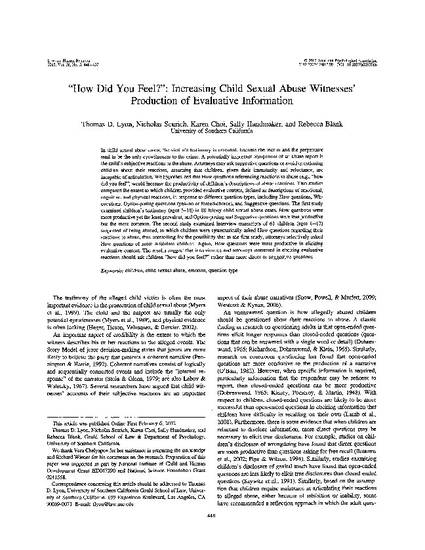
Article
26. “How did you feel?”: Increasing child sexual abuse witnesses’ production of evaluative information.
Law & Human Behavior
(2012)
Abstract
In child sexual abuse cases, the victim’s testimony is essential, because the victim and the perpetrator tend to be the only eyewitnesses to the crime. A potentially important component of an abuse report is the child’s subjective reactions to the abuse. Attorneys may ask suggestive questions or avoid questioning children about their reactions, assuming that children, given their immaturity and reluctance, are incapable of articulation. We hypothesized that How questions referencing reactions to abuse (e.g., “howdid you feel”) would increase the productivity of children’s descriptions of abuse reactions. Two studiescompared the extent to which children provided evaluative content, defined as descriptions of emotional,cognitive, and physical reactions, in response to different question-types, including How questions, Whquestions,Option-posing questions (yes–no or forced-choice), and Suggestive questions. The first studyexamined children’s testimony (ages 5–18) in 80 felony child sexual abuse cases. How questions weremore productive yet the least prevalent, and Option-posing and Suggestive questions were less productivebut the most common. The second study examined interview transcripts of 61 children (ages 6–12)suspected of being abused, in which children were systematically asked How questions regarding theirreactions to abuse, thus controlling for the possibility that in the first study, attorneys selectively askedHow questions of more articulate children. Again, How questions were most productive in elicitingevaluative content. The results suggest that interviewers and attorneys interested in eliciting evaluativereactions should ask children “how did you feel?” rather than more direct or suggestive questions.
Keywords
- child witnesses,
- child abuse,
- child neglect,
- child development,
- child psychology
Disciplines
Publication Date
January, 2012
Citation Information
Lyon, T. D., Scurich, N., Choi, K., Handmaker, S., & Blank, K. (2012). “How did you feel?”: Increasing child sexual abuse witnesses’ production of evaluative information. Law & Human Behavior, 36, 448-457. doi:10.1037/h0093986
